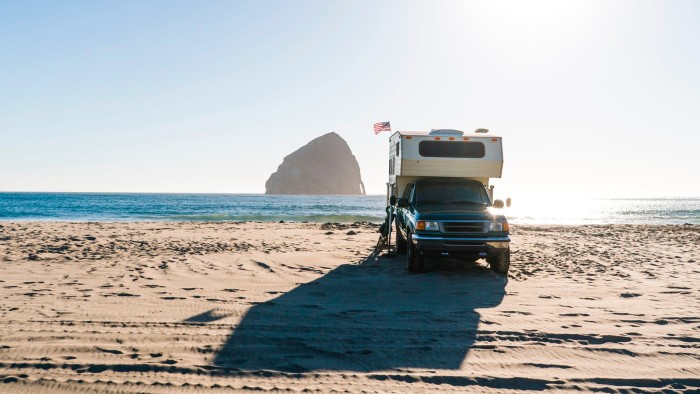Unlock the Editor’s Digest for free
Roula Khalaf, Editor of the FT, selects her favourite stories in this weekly newsletter.
Zoom calls. Peloton bikes. To the list of pandemic-era businesses that have struggled to keep the good times going, add this: the humble caravan — or as it’s known in the US, the recreational vehicle.
Following a pandemic surge when it seemed like everyone — freshly untethered from their desk jobs — was embarking on adventures out on the open road, Americans are taking a break from what social media users call #VanLife.
Shipments of RVs from manufacturers to retailers totalled just 333,733 last year, according to the RV Industry Association. That’s roughly half the peak reached in 2021 and back at the levels seen during the early 2010s. The RVIA expects sales to be in the range of 320,400 to 353,500 units this year.
The reasons for this are simple enough. Uncertainty around Donald Trump’s tariffs and worries about the broader outlook for the US economy have knocked consumer confidence. High interest rates give shoppers a reason to hold back on big-ticket items often partly paid for with debt. The not-always-glamorous reality of van life — and pressure from employers to get back to the office — have further dulled the movement’s shine.
This has left RV and RV-adjacent stocks stuck in the mud. Shares in Thor Industries, the $5bn company behind Airstream and other brands, are down by about a third from their all-time highs. Those of rival manufacturer Winnebago Industries and dealer Camping World have both shed more than half of their value since peaking in 2021. And units of real estate investment trust Sun Communities, which owns more than 200 RV parks in the US and the UK, are down by 40 per cent.
While RVs are built in the US, many parts come from overseas, so makers have had to roll with the rise in trade levies. Some have shifted to lower-priced, lower-margin, smaller RVs. Even so, Winnebago’s revenue fell 10 per cent in the nine months ending in May; earnings fell by more than two-thirds. For the full year it expects adjusted earnings per share of, at best, half what it made last year. Thor has suffered too, though less badly.
Strangely, Thor and Winnebago shares are no bargains. The shares respectively trade on a multiple of 22 times and 15 times forward earnings. That is well above the five year average of 14 and 10 times.
It may be because the long-term demographic trends such as the wave of retiring baby boomers remain favourable for the RV industry. At the same time, millennials are unlikely to abandon the lifestyle completely. And if housing remains chronically unaffordable, others will embrace #VanLife out of necessity. The trend, for all it has slowed, has yet to run out of road.
